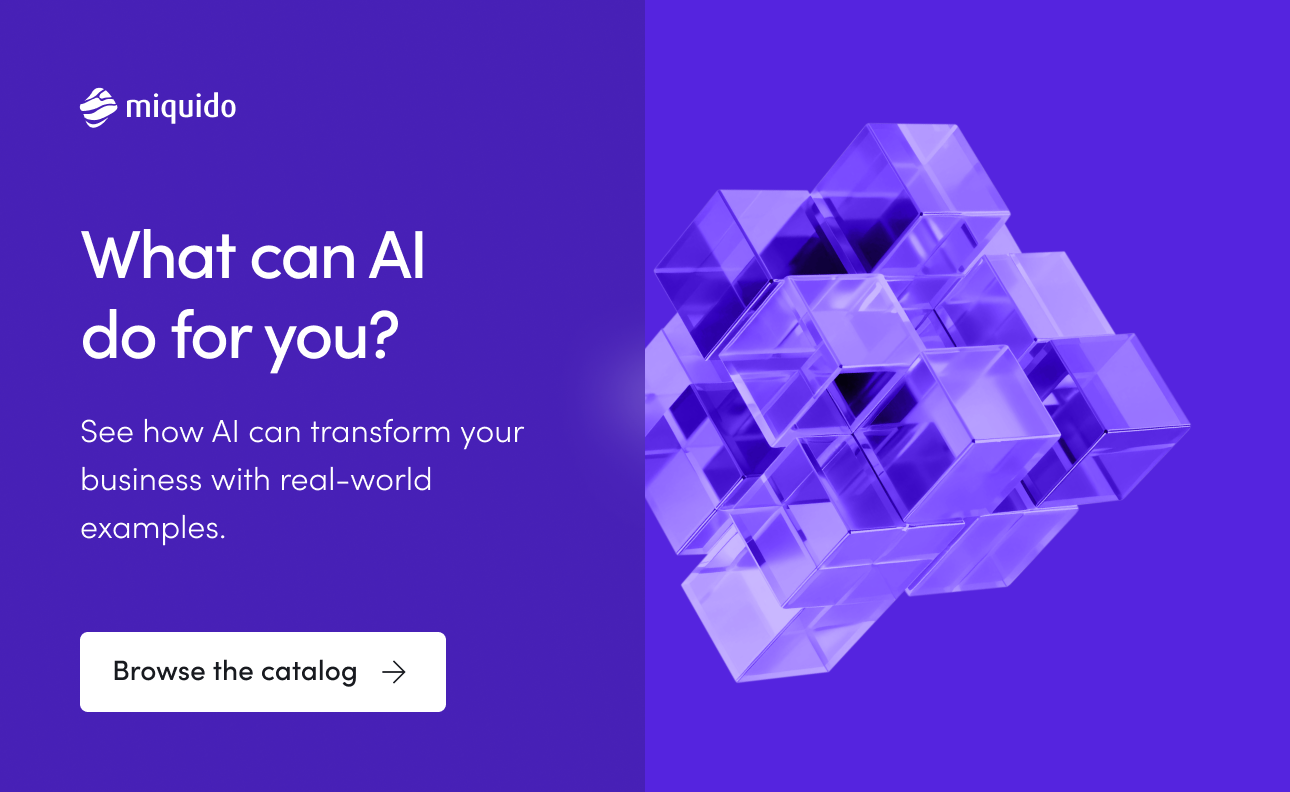Companies around the world are constantly striving to improve their strategies, understand customer needs and stand out from competitors. AI isn’t just a tech buzzword, it’s something that can actually help you face these, and many more, challenges.
Even though it’s not a novel trend anymore, and a perceptron, a single-layer neural network, was actually invented in 1958, it’s only been a few years now since AI became widespread in business. In fact, nearly half of all digitally mature companies have a defined AI strategy. What is more, over 70% of executives have identified AI and machine learning as game-changers.
AI services are no longer reserved for global corporations. We can observe the rise of AI in SaaS companies and startups, as well as in other small and medium-sized enterprises. Every company, in some ways, can take advantage of emerging technologies, including AI. Read on to learn more about AI in business and its applications.
What is AI?
You have probably heard a lot about artificial intelligence in the media and from professionals since it’s quickly becoming one of the main factors that shape modern companies. So let’s take a closer look at the definition of what AI actually means.
Artificial intelligence (AI) is a branch of computer science that focuses on teaching computers to react like humans. This process requires analysing a vast amount of data in a contextual manner and responding accurately.
Simply put, intelligent machines can “think” (react and solve problems) like humans once they have been provided with an abundance of information from which to learn how to do so. Once they have, these machines are able to make the user experience similar to interacting with an actual human. Data enables computers to continuously learn and adapt. They can analyse input and build their knowledge, including finding patterns, to learn how to solve problems.
The term AI is widely used, since it includes a range of technologies that cover more specific methods. Among the main subfields of AI we can list, for example, machine learning (ML), computer vision, robotics, and natural language processing. Moreover, AI is continually revolutionising our world. Gartner indicates that by 2021, 80% of emerging technologies will have AI foundations. Let’s dig into AI solutions that can help to improve businesses.
Are you still curious for more insights about AI? Check our comprehensive guide to artificial intelligence in business!
AI in business: benefits
Artificial Intelligence can be applied in organisations across a wide range of industries and fields, like retail, healthcare, transportation and logistics, or finance and advertising, for example. But why is AI desired by so many companies around the world? Well, quite simply, it provides many advantages!
Saving time and providing insights
Thanks to data analysis and automation, computers can deal with repetitive tasks and operations that are impossible to process manually. AI boosts productivity, since you and your team can concentrate on creative tasks instead. Moreover, the ability to recognise patterns in data creates an opportunity to predict outcomes. AI enables executives to make data-driven decisions and focus on the bigger picture.
Reducing mistakes
AI-driven systems can often reach values unmatched by humans. One of the recent examples is a breast cancer detection system which accuracy is estimated at 99%. AI-fueled solutions, when based on correctly assembled data, are more objective than humans because machines only rely on facts, not on opinions and emotions.
Acting in real-time
Humans aren’t good at doing many different things simultaneously, indeed research indicates that only 2% of people can multitask effectively. On the contrary, computers are able to handle many tasks at once. AI-powered software can interact with many customers at the same time, gather data and send real-time notifications. Additionally, machines don’t need breaks, they can work 24/7 just as efficiently, and can find information necessary to answer queries in no time. On the contrary, people work in business hours and have to put time and effort into looking for needed details.
Improving customer experience
Your potential and existing customers should be at the centre of your attention. By implementing AI-fueled solutions in your business strategy, you can enhance many aspects of your customer journey.
Actually, the advantages of AI in business don’t end here. They’re rather only limited (or not) by your usage of this technology.
AI in business: applications
How exactly can AI facilitate business? Learn about some exemplary intelligent solutions that companies can profit from.

Conversational AI
Thanks to automated messaging and speech-enabled applications which mimic human-like interactions between computers and humans, businesses can deliver faster customer service and streamline the purchasing process. Conversational interfaces, like chatbots and voice assistants, use natural language processing and ML development to improve understanding and respond appropriately.
You can implement chatbots in an app via live chat on a website or Facebook Messenger, in Slack or in Viber, for example. By integrating your customer service solution with a customer relationship management (CRM) system, and other business tools, your bots can use existing information to personalise communication.
Voice user interfaces (VUI) also benefit from speech recognition technology. You can apply them in voice assistants (solutions by giants such as Google, Microsoft, Amazon and Apple). Nevertheless, other businesses can also benefit from VUI, by developing their own apps integrated with voice assistants through platforms such as Actions on Google and Alexa Skills Kit. This way, you can take advantage of voice assistants and extend their functionality with your own apps.
Thanks to conversational AI, you can automatically deliver immediate answers without engaging your agents in the customer support process. Machine learning enables text and voice bots to recognise patterns and learn how to solve new problems. The more data and experience it has, the more intuitive and human-like your bot will become.
Smart product recommendations and personalisation
AI can enhance advertising and sales, since it utilises data to understand user behaviour and identify preferences. Advertising Technology (AdTech) uses data analysis to create personalised experiences for tailored target groups. AI-fueled marketing solutions, based on viewer habits and previous user interactions, enhance targeting so that ad campaigns can reach a precise audience with the appropriate content.
Smart recommendations are also used to personalise social media news feeds, suggest media via streaming services like Spotify and Netflix, as well as for matchmaking (for example, in dating or event networking apps). An implementation of AI-powered recommendations comes in handy in the travel industry. For instance, AirBnb and Booking.com enable intelligent search engines within their platforms. Therefore, users get search results based on their previous bookings, searches, amenities and many more variables.
Innovative online retailers provide virtual shopping assistants to improve conversational commerce. Customers can receive smart recommendations based on their idiosyncratic traits and tastes.
Furthermore, AI-driven marketing tools can automatically personalise messages. Modern brand communication usually doesn’t limit personalisation to a customer’s name in an email, but goes beyond expectations by delivering relevant content and product recommendations. Undoubtedly, such techniques can improve the customer experience and boost user engagement, which may increase sales as a result.
AI in Business Intelligence
As the term indicates, Business Intelligence uses smart systems to analyse data and provide entrepreneurs with insights about their companies and customers. Data mining allows for the discovery of patterns and therefore the offering of relevant business recommendations. Based on Big Data, predictive analytics allows executives to make data-driven decisions and effectively optimise costs, as well as to seize great business opportunities.
Thanks to data science, you can benefit from all previously gathered digital information about your customers (internal and external databases, websites, apps and social media, etc.) to foresee buyer expectations and, therefore, to meet or exceed them. In addition, a part of data science is data visualisation. For executives and stakeholders, it’s essential to fully understand data to make informed decisions. Therefore, while analysing data, its presentation plays a huge role. Data visualisation can help you focus attention on specific elements and tell a story behind numbers.
Another application of AI in business is anomaly detection. AI-powered systems armed with Machine Learning algorithms are able to identify irregular behaviour within the data pool. You can conduct This process in two ways, either supervised (when a computer identifies abnormalities with trained patterns) or unsupervised (when a system makes a judgment on its own about anomalies in the data). This is crucial for the financial sector, as well as every major organisation and manufacturer, since they are often more exposed to cyber threats, such as fraud. Nevertheless, even startups and SMEs should be aware of such risks, and try to prevent them.
AI in Manufacturing
The manufacturing sector can benefit from AI by using it to focus on increasing efficiency and improving product quality. AI automation can decrease the demand for labour, as well as enhance product design. Intelligent machines are able to suggest more efficient designs based on input parameters such as the estimated budget, requirements, or material types, etc. That way, designers and engineers can choose the most optimal solutions. AI in manufacturing can also be used for detecting defective products, as well as in predictive maintenance to identify issues in factories before they occur.
Examples of AI in business
PZU — Voice assistant for instant travel insurance
PZU’s Insurance Assistant provides an AI-fueled voice advisor for purchasing travel policies via mobile devices. The Assistant gathers all essential information about a trip in order to recommend the most suitable travel insurance. Users can select the best deal using VUI and save precious time by doing so.
Timesheets — in-depth insights based on work reports
Timesheets is the simplest time tracking tool in which you can track time, generate reports, add as many team members as needed. It provides custom Business Intelligence dashboard to easily spot irregularities in the reports and make sure that no hours are missed in the reporting and invoicing process.
Additionally, Timesheets offers AI-fueled chatbots for fast tasks reporting. Employees can use several communication channels, such as Google Assistant, Amazon Alexa, Siri, Google Hangouts Chat and Slack.
Planter — Plant recognition module for a plant care Flutter mobile application
Planter is an AI-based plant care advisor. The project included dataset preparation, custom design of a recognition model based on convolutional neural network and model export to a mobile format. Thanks to advanced image recognition, Planter identifies species of plants based on a photograph and provides users with guidance on how to care for plants, considering its watering preferences, preferred type of soil, fertiliser etc.
Key takeaways for AI in business
Artificial Intelligence can automate many processes in order to save time that can be better used for unleashing human creativity. Some examples of AI-based solutions include:
- personalising and targeting ads
- 24/7 customer service via phone and chat
- conversational commerce
- recognising objects
- tracking customer behaviour
- supporting HR
- opinion mining
- product recommendations
- reducing labour costs with robotics
- predictive analysis
- optimising costs
- updating files
- detecting fraud
We hope that you’re now even more familiar with the capabilities of AI. While your company could probably survive without some of the solutions mentioned above, maybe you’ve identified other challenges that might be faced with AI-based tools. The first step to boosting your business with these emerging technologies is to recognise your obstacles and find the right existing intelligent software, or to create a tailor-made solution for yourself.
If you are considering implementing artificial intelligence in your business strategy, check out our guide on how to choose an AI software development company.







